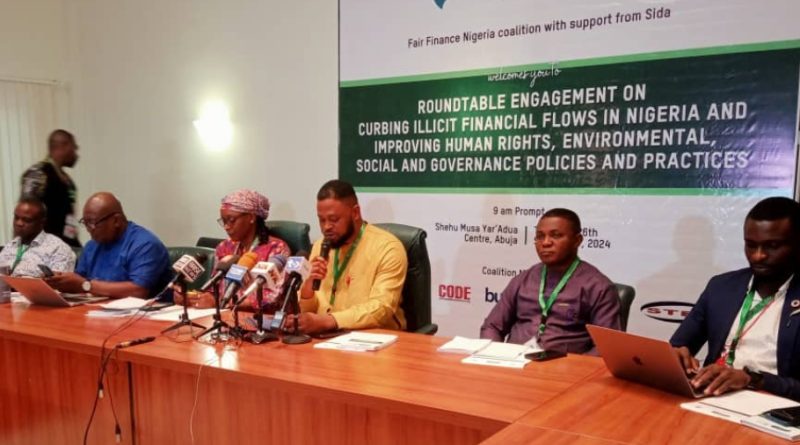Nigeria Loses $18 Billion Annually to Illicit Financial Flows – Experts Call for Urgent Reforms
Maryam Aminu
Nigeria is hemorrhaging over $18 billion annually through illicit financial flows (IFFs), with grave consequences for its economic development. Experts at a policy roundtable, held on September 26, 2024, at the Shehu Musa Yar’Adua Centre, Abuja, called for immediate reforms to stem these losses.
Organized by the Civil Society Legislative Advocacy Centre (CISLAC), the event focused on curbing IFFs, promoting human rights, and fostering responsible finance practices within the Nigerian financial sector.
Auwal Ibrahim Musa Rafsanjani, Executive Director of CISLAC who was represented by the
Senior Program Officer
CISLAC, Ayo Omowu emphasized the need for ethical banking and finance practices to combat IFFs.
Omowu highlighted the work of Fair Finance Nigeria (FFNG), an initiative led by CISLAC in collaboration with Fair Finance International and Oxfam Nigeria.
“Our goal is to promote fair finance practices within Nigeria’s banking and corporate sectors, ensuring that financial decisions are aligned with global environmental, social, and governance (ESG) standards,” Rafsanjani said.
He explained that the FFNG campaign is particularly focused on improving transparency and accountability within the oil and gas sector.
“We are working with the Nigerian National Petroleum Company Limited (NNPCL), the Central Bank of Nigeria (CBN), and selected commercial and development banks to instill accountability mechanisms that will curb illicit financial activities,” he noted.
Rafsanjani called for greater collaboration between industry stakeholders to ensure that sustainable finance practices take root in Nigeria.
“Fair finance is not just about profit; it’s about ensuring that financial institutions contribute positively to society and the environment,” he concluded.
Also speaking, the programme Manager, OXFAM, Henry Ushie offered a global perspective on IFFs, stressing that multinational oil companies operating in Nigeria must adhere to international best practices, especially in terms of human rights and environmental stewardship.
“We need to ensure that these companies follow the UN guiding principles on business and human rights,” Ushie said, calling attention to issues such as crude oil spills and gas flaring that harm local communities.
He urged oil companies to be held accountable for the environmental degradation caused by their operations.
Ushie also raised concerns over the billions lost through tax avoidance by companies operating in Nigeria.
“Many multinational companies exploit tax loopholes, facilitated by highly skilled lawyers, to avoid paying their fair share of taxes,” he explained.
Ushie called on the Nigerian government to enforce existing tax laws more strictly, noting that stronger implementation would help retain vital resources within the country.
“We don’t need new laws; what we need is better enforcement of the ones we already have,” he emphasized.
Ushie urged communities to hold companies accountable for their social and environmental practices, ensuring that businesses contribute to the well-being of the people and the nation at large.
In sum, the experts agreed that curbing illicit financial flows requires concerted efforts from government, financial institutions, and civil society.
“By strengthening regulatory frameworks, enhancing transparency in the oil sector, and holding companies accountable for their actions, Nigeria can reclaim billions in lost revenue and reinvest it in sectors critical to its development.” He said
Speaking further Dr. Harry Udoh of STEP, painted a grim picture of how IFFs are draining resources that could be channeled into critical sectors like education and healthcare.
“With the estimated $18 billion that Nigeria loses annually, we could improve our educational system, bolster healthcare, and lift millions of Nigerians out of poverty,” Udoh said.
He attributed the bulk of these illicit flows to activities in the oil sector, where politically exposed persons (PEPs) and multinational corporations exploit opaque systems and weak oversight to siphon off funds.
Udoh further pointed to the fuel subsidy scam as a major conduit for IFFs, noting that the government’s inability to track pricing and the quantity of crude oil exported contributes to the problem.
“We are losing money because we have no idea what is being taken out or how much it is worth. The government needs to ensure full transparency in the oil sector,” he emphasized.
Udoh called on banks to be more vigilant, stating that strong Know Your Customer (KYC) protocols could help track and prevent these illicit flows.
“Banks are the channels through which these funds move. They must be more responsible in monitoring where the money comes from and where it’s going,” Udoh stressed.




